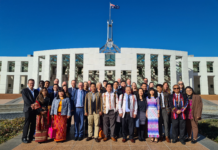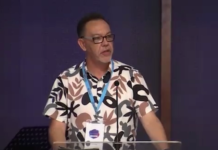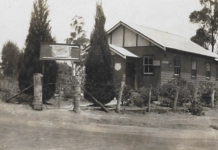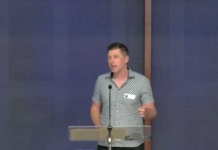
The West Wing television series had much to say about political processes. Although based on the American experience it treated universal themes of democracy and engagement with public policy so that it enjoyed a widespread following. In one episode, The God Problem, an issue emerged for the republican candidate who was challenging for the presidency.
It appeared, subsequent to his nomination as republican candidate, that the candidate neither attended church nor did he profess to a personal faith in God. In America this is a big problem for politicians. The candidate struggles to explain his position with integrity to the electorate. He warns the voters that ‘if you demand expressions of religious faith (faith test) from politicians, you are just begging to be lied too… And it will be the easiest lie they ever had to tell to get your votes.’
Baptists are similarly wary, for different reasons, of the nexus between faith and politics. We have, what can be regarded as, competing traditions when it comes to political involvement. On the one hand our origins set us apart as suspicious of political processes. We have traditionally taken deliberate steps to shape our lives in ways distinctive to ‘worldly’ consideration. Be ye separate was the catchphrase of our forbears. Secular structures were perceived as intrinsically flawed by sin, therefore, it was thought, our endeavours ought to be more appropriately marked by heavenly pursuits such as evangelism and discipleship. However, the call to ‘walk in all His ways’, calls us to ground all our thinking and actions under the scrutiny of the gospel. Therefore voting is as worthy of serious Christian reflection as any other human activity.
As we face the approaching election campaign it is inevitable that different Christian organisations will seek to apply a ‘faith test’ of sorts to our aspiring political leaders and candidates. Some will send questionnaires to candidates asking them to declare where they stand on a range of, what some consider touchstone, issues such as abortion, marriage rights for the gay and lesbian community, creationism, support for Christian schools and more. The politicians who respond are then scored as to their answers and how closely they align with the organisation’s approved positions. Christian Magazines profile politicians known for their Christian identity and provide subtle endorsement to those candidates because of their known Christian allegiance.
The election campaign is also a time for the forging of new political parties. Some are formed solely on the basis of their Christian identity. Family First, the Christian Democratic Party and the newly formed Rise Up Australia run by Pastor Danny Nalliah are examples. These parties claim to speak for Christians to issues of concern held by many Christians. As such they have a significant reach into Christian communities.
Despite all this many Christians compartmentalise their thinking when it comes to voting. They may not want to vote for a Christian candidate because they believe there is no place for Christian involvement in politics therefore it is not possible to think about politics in a Christian way. Voting can be based on a mixture of considerations other than Christian such as family voting patterns and local issues.
John Dickson, church historian and Anglican commentator, argues that voting is a matter of Christian discipleship. He firstly provides some guidance as to how not to vote. In summary he suggests that we ought not to vote:
- without thinking
- for a Christian just because they are a Christian or
- for the bottom line He then outlines some principles which should inform our voting.
He argues that we ought to vote:
- for the sake of others
- for righteousness and justice in our community
- for the poor and the weak
- for the freedom to preach the gospel and
- prayerfully
For a fuller explanation of John Dickson’s views go to http://www.afes.org.au/article/ how-should-christian-vote.
Voting is a serious business. It is reasonable to expect integrity and truthfulness from our leaders. It is disheartening when we see an institution such as democracy tainted by manipulative processes and, worse still, corrupted by ambition and greed. We do not place all our hope in the democratic process but at the very least, as good citizens, we can exercise our opportunity to contribute to good government by voting well when we do vote.



































